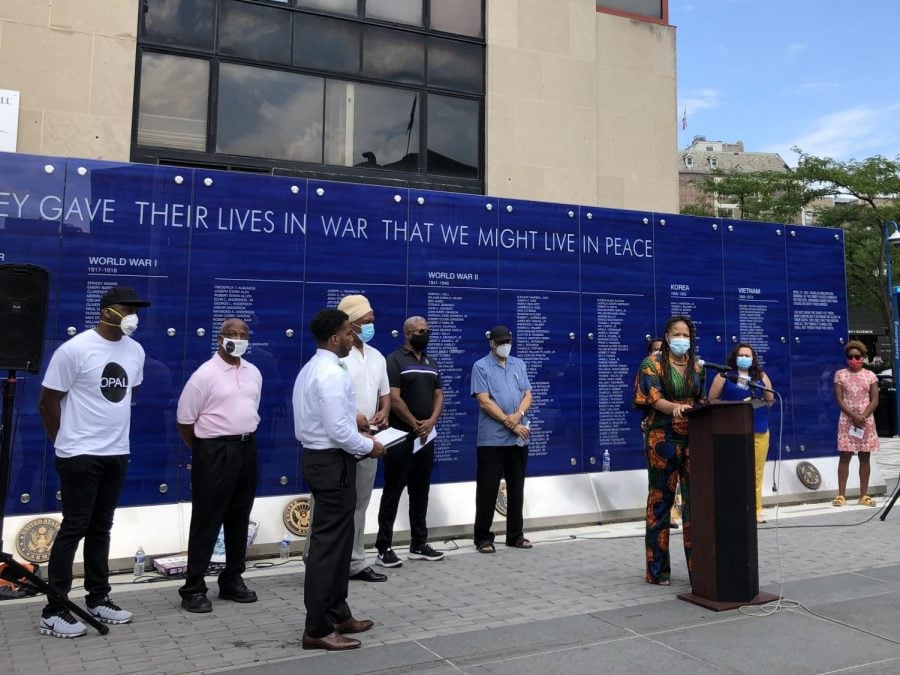Ald. Rue Simmons, twelve black organizations announce proclamation for black justice
James Pollard/Daily Senior Staffer
Ald. Robin Rue Simmons (5th) speaks at Sunday afternoon’s press conference. Rue Simmons and others called for specific actions to undo years of anti-black racism in a proclamation for black justice.
August 23, 2020
Evanston has a history of anti-black racism that persists today, Ald. Robin Rue Simmons (5th) and a group of black Evanston residents said Sunday as they called for action to undo years of harm.
The group, consisting of educators, a reverend, a therapist and others, made their proclamation for black justice with the support of a dozen black organizations in Evanston. Rue Simmons, who has led the movement for reparations in Evanston, called for reparations now, saying “anything less is inadequate.”
“This is an emergency,” Rue Simmons said. “The damages of anti-black racism sustain systemic oppression as our disparities are widening in this time of COVID-19. Today we are united in one voice, with one goal and one commitment to lead our city towards full repair of the black community. We are encouraged by recent commitments and a growing ally community but we will not be satisfied until our people are whole, safe and well.”
A series of speakers expanded on those disparities and highlighted the ways racism has pervaded housing, education and health in Evanston.
The overdevelopment of the white community in Evanston, Dr. Gilo Logan said, is the underdevelopment of the black community.
Logan compared the funding available for Robert Crown Community Center, but not Family Focus, a nonprofit offering classes and resources for families in need of assistance, primarily serving 5th Ward residents. He also pointed to the lack of a community school in the historically underserved 5th Ward.
“Black people have a condition, not a problem,” Logan said, referencing a quote from the civil rights organizer Rev. C.T. Vivian. “Whites have the problem. It’s called racism, which creates our condition.”
Several speakers called for a science, technology, engineering and mathematics school in the 5th Ward, a project that has been in the works for over two-and-a-half years. Dr. Nichole Pinkard, a SESP professor and faculty director of the Office of Community Education Partnerships, said Evanston’s existing civic infrastructure — schools, parks, libraries, business districts and more — has become “the visible and invisible guardrails” shaping access to essential activities and resources.
“Much of the placement and design of the civic infrastructure (in Evanston and across the country) occurred during periods when urban planning decisions were, at best, made under framing of black lives mattering least,” Pinkard said. “Or, at worst, under an intentional racist framing designed to stop the healthy formation of strong, reliable African American communities.”
A child’s ability to walk from home to school, Pinkard said, affects their ability to participate in out-of-school activities. To help fix these problems, Pinkard invited civic institutions to work with existing black organizations to reestablish the “necessary infrastructure” to rebirth trusted out-of-school institutions.
Tasha Nemo, an elementary school teacher, activist and artist, highlighted the need for educational reform, saying “integration of students and staff doesn’t work if textbooks are not integrated, inclusive and honest.”
Her role as a teacher is ironic, she said, because growing up, she never truly saw herself in the English or history curriculum in her schooling.
Her parents and an after-school program she attended on African history taught her that as a black woman, she was “a force to be reckoned with.” Without that, she said she wouldn’t have been able to do her job.
But all students deserve to have what her parents and that club taught her, she added.
“It’s time we throw out the history curriculum because it serves no one,” Nemo said. “White kids learn to be consciously and subconsciously racist while students of color continue to learn to be inferior and hate school. We have an opportunity to change that.”
Email: [email protected]
Twitter: @pamesjollard
Related stories:
— Reparations subcommittee to use $400,000 toward restorative housing programs
— Reparations subcommittee recounts Evanston’s history of discriminatory policies and practices
— Reparations subcommittee discusses Home Buyer Assistance Benefit Program


